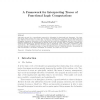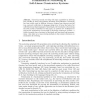140
click to vote
ENTCS
2002
15 years 1 months ago
2002
In this work we provide a semantic description of functional logic languages covering notions like laziness, sharing, and non-determinism. Such a semantic description is essential...
169
Voted
CORR
2004
Springer
15 years 1 months ago
2004
Springer
Many functional logic languages are based on narrowing, a unification-based goal-solving mechanism which subsumes the reduction mechanism of functional languages and the resolutio...
100
click to vote
ENTCS
2007
15 years 2 months ago
2007
Programs in modern functional logic languages are rewrite systems following the constructor discipline but where confluence and termination are not required, thus defining possi...
133
click to vote
ENTCS
2007
15 years 2 months ago
2007
This paper is part of a comprehensive approach to debugging for functional logic languages. The basic idea of the whole project is to trace the execution of functional logic progr...
134
click to vote
ENTCS
2007
15 years 2 months ago
2007
In modern functional logic languages like Curry or Toy, programs are possibly non-confluent and nonterminating rewrite systems, defining possibly non-deterministic non-strict fu...
124
click to vote
CORR
2006
Springer
15 years 2 months ago
2006
Springer
In this paper, we present our proposal to Constraint Functional Logic Programming over Finite Domains (CFLP(FD) ) with a lazy functional logic programming language which seamlessl...
132
click to vote
ENTCS
2008
15 years 2 months ago
2008
Most implementations of functional and functional logic languages treat numbers and the basic numeric operations as external entities. The main reason for this is efficiency. Howe...
131
click to vote
FLOPS
2008
Springer
15 years 3 months ago
2008
Springer
Narrowing extends rewriting with logic capabilities by allowing free variables in terms and replacing matching with unification. Narrowing has been widely used in different context...
112
click to vote
WFLP
2000
Springer
15 years 5 months ago
2000
Springer
Abstract. Traditionally, machine learning algorithms such as decision tree learners have employed attribute-value representations. From the early 80's on people have started t...
135
click to vote
WFLP
2000
Springer
15 years 5 months ago
2000
Springer
We introduce a framework for assessing the effectiveness of partial evaluators in functional logic languages. Our framework is based on properties of the rewrite system that models...


